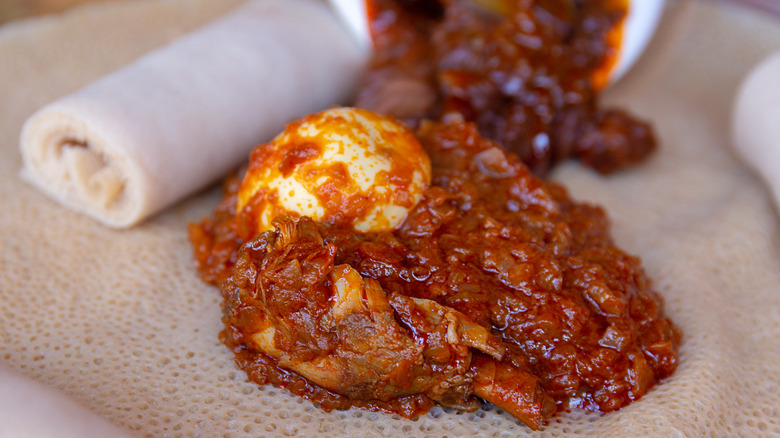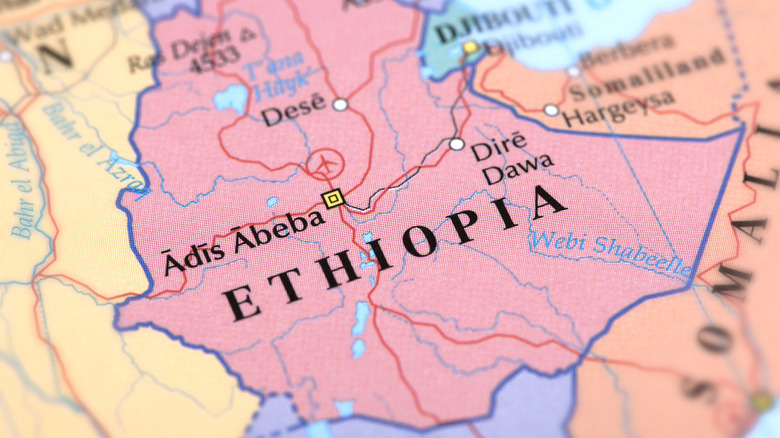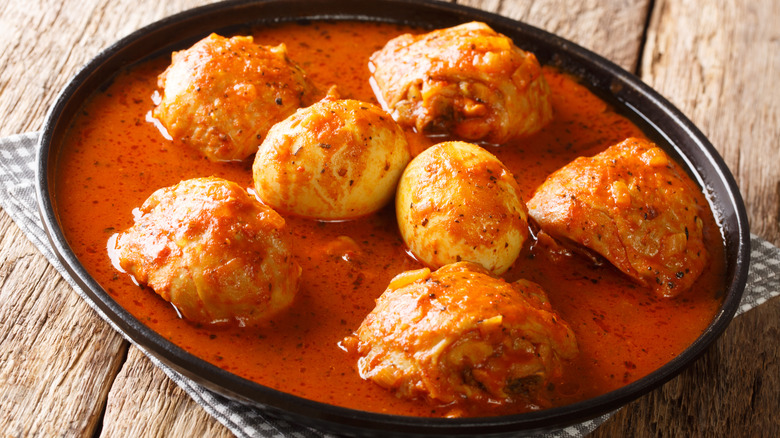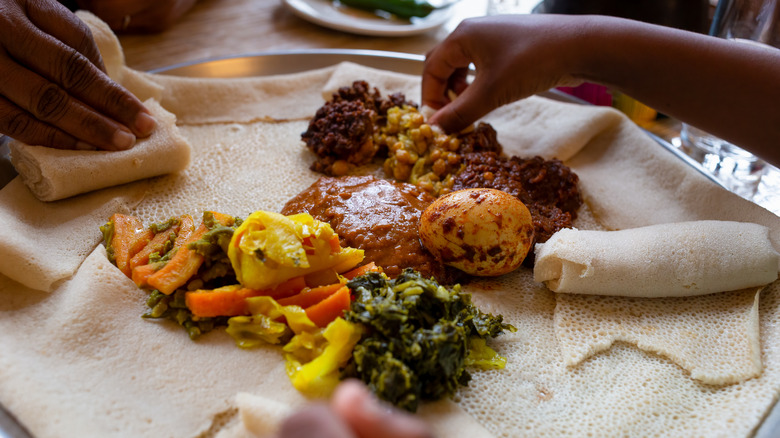Hard-Boiled Eggs Are A Key Ingredient In The National Dish Of Ethiopia
Several West African cuisines have exploded onto the international food scene, thanks to certain playful controversies like the jollof rice wars and the increasingly TikTok-famous fufu. And while Nigerian, Ghanaian, Senegalese, and more West African cuisines are certainly worth discovering and trying out for yourself, some other nations in different regions have flown under the radar a little too long for our liking.
Ethiopian food, for instance, has been slower to make its way to global fame. However, the country's spicy, earthy stews, seasoned meats, vegetarian-friendly beyaynetu, and tangy injera are definitely worth getting to know. And, there's no better introduction to Ethiopian food than starting with the country's national dish, doro wat.
This super spicy chicken and egg stew is a dish reserved for celebratory meals, and it's for good reason. It takes a great deal of time to make its flavors meld and come together, and it's cloaked in centuries-old tradition and symbolism.
History of doro wat
Doro wat has become widely recognized as the national dish of Ethiopia, and it's easy to see why. Doro wat first originated with the Amhara people, one of the largest ethnic groups in the country. In fact, doro means chicken in the Amhara language. However, the dish has since spread to be prevalent and meaningful across the East African nation.
Doro wat is not typically eaten as an everyday meal. Rather, it's reserved for certain celebrations, mainly important holidays and large family events. One of the reasons for this is the long cook time, but there's also a lot of ritual and tradition embedded in the preparation process. For example, Eater notes that many Ethiopians will prepare a whole chicken themselves and purposefully separate it into 12 pieces, a number that is said to represent Jesus' 12 disciples.
However, it's not just the chicken that serves an important role in this dish. From the integral berbere spice mix to the caramelized onions, there are many ingredients that elevate this meal to super-star status.
Ingredients in doro wat
Chicken thighs or wings are the typical cut of meat used in this dish, and the meat is seasoned with a seemingly endless list of spices. Among the sauce-covered meat are a few hard-boiled eggs that add a fluffy richness and absorb much of the stew's flavor, making it an essential element to this satisfying meal.
There is a long list of essential spices that get added into this stew. Berbere is Ethiopia's go-to spice blend that is just as hot as the bright red color suggests and is often hand-made from whole spices such as cumin, cardamom, coriander, cloves, fenugreek, red chilies, turmeric, paprika, cinnamon, and nutmeg, which get toasted, ground, and mixed together.
Niter kibbeh, Ethiopian-spiced ghee, is also an essential ingredient to ensure an authentic taste. Spices like ginger, garlic, turmeric, and black cardamom infuse the clarified butter, making it an ideal addition to stews and curries.
Many say the slow-cooked onions or shallots, cooked in the niter kibbeh, will make or break the dish. The pungent yet sweet taste is needed to fully pull together all the layers of flavor present in doro wat. But, in order to get this essential component right, you'll have to set aside a large part of your day.
How doro wat is made and eaten
In fact, it can take nearly three hours for everything to come together, but the bubbling-hot, satisfyingly spicy results will assure you it's worth it. The first step of making this dish is to start working on caramelizing the onions or shallots right away, as this is the step that takes the longest. The onions can be sautéed in the niter kibbeh (or another fat) and left to cook for just shy of an hour. Other aromatics and spices are eventually added in staggering increments.
Finally, the super fragrant, buttery concoction will penetrate your entire kitchen. At this point, the chicken can be added in, along with some broth. After about another hour, the chicken will be ultra-tender. The hard-boiled eggs should be added just before serving, and then it's ready to be plated.
Doro wat can be served solo in a dish, or it can be paired on a platter alongside other stews, curries, or steamed vegetables such as potatoes, carrots, or cabbage. When serving your steaming hot doro wat, you'll want to make sure you pair it with the country's famed thin and spongy flatbread, injera, that can be offset by its tangy taste. You could also opt for plating it over a bed of rice to help soak up the flavors.



